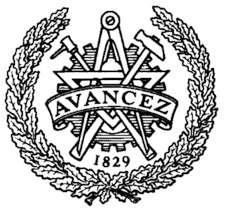Chalmers University of Technology
(Chalmers tekniska högskola)
Sweden
Shortname: CHALMERS
Description of the organization
Chalmers University of Technology was founded in 1829 following a donation by William Chalmers and was transformed into an independent foundation in 1994. Chalmers’ annual turnover is approximately 2 billion SEK (appr. 220 million EUR), out of which two-thirds are related to research. More than 11,000 people, including over 8,000 undergraduates, work and study in some of Chalmers’ departments and divisions. The university offers PhD and Licentiate programs as well as MScEng, MArch, BEng and nautical programmes. There are around 8,600 students taking undergraduate programs leading to 1,300 Master’s degrees annually. More than 1,000 students are involved in graduate and doctoral programs leading to around 340 PhD and Licentiate of Technology degrees each year. Chalmers is involved in approximately 140 industrial and educational projects within the EU programmes.
Main tasks attributed / previous experience related to those tasks
Nuclear Chemistry/Industrial Recycling at Chalmers has been working for more than 50 years in the development of solvent extraction processes. During the last 30 years research has been made in many different areas but the main fields have been:
- Partitioning and transmutation,
- Actinide chemistry,
- Solvent extraction chemistry,
- Chemistry related to deep geological disposal,
- Chemical modelling and associated uncertainty and sensitivity analysis,
- Thermo dynamical data
- Recovery of precious metals from different waste streams
We have been actively participating in about 15 EU-frame work programmes on various topics. Over the years hundreds of publications concerning the special chemistry of the actinides have been published in various per-reviewed scientific publications.
Short profiles of the key staff members
Prof Christian Ekberg, is a full professor of both nuclear chemistry and industrial materials recycling and scientific coordinator of SNEC (Sustainable Nuclear Energy Centre, Sweden), with more than 100 reviewed publications and about 30 reports in his publication list. His main activities have been solvent extraction, thermodynamics, statistics and geochemical modelling. He is
co-author of the updated version of the well-known book “Radiochemistry and nuclear chemistry” by Rydberg and Choppin as well as two additional books.
Dr Teodora Retegan has published about 20 refereed publications and 7 reports. Her main research activities are solvent extraction, partitioning for transmutation, actinide chemistry.
